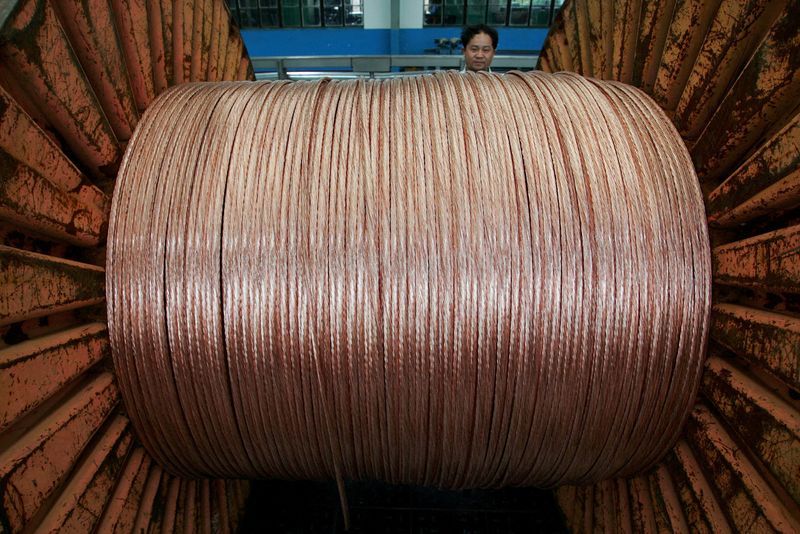(This Jan. 20 story has been refiled to add dropped words in the eighth paragraph)
By Siyi Liu and Dominique Patton
FOSHAN, China (Reuters) - China's copper buyers face higher costs for the metal this year, buyers and analysts said, after market disruptions from top importer Maike Group's financial woes and production glitches at domestic smelters pushed local premiums to their highest in years.
Copper traders around Shanghai and in industrial Guangdong province to the south say the premium that buyers pay above futures prices for domestic copper have surged since the second half of last year, potentially affecting the renewable energy and construction sectors that rely heavily on the metal.
"Import supply disruptions caused by Maike, together with local smelters' maintenance, drove up the premium," said Long Huachen, a copper analyst at industry information provider Shanghai Metals Market (SMM).
He was referring to Guangdong, which makes about one-eighth of China's products from refined copper and where he expects copper imports to decline by 115,000 tonnes this year, or about one-fifth, even with some smaller traders stepping up supplies.
"The supply of imported refined copper remains the top uncertainty," he said.
Graphic: China's 2021 refined copper imports https://www.reuters.com/graphics/CHINA-COPPER/MAIKE/xmpjklqmwvr/chart.png
Privately held Maike, which was especially active in Guangdong and Shanghai and supplied about half of Guangdong's imported copper, abruptly halted all its copper purchases in the summer of 2022 after it ran out of cash to pay suppliers.
Maike's absence has encouraged some direct trade between sellers and buyers in the market but they face challenges.
"It takes time to reduce the counterparty risk for any of these stakeholders given Maike's size," said Zerlina Zeng, a senior research analyst at CreditSights, a subsidiary of Fitch Solutions.
One copper buyer who previously bought from Maike said being a small buyer has put them at a disadvantage when it comes to price negotiations with overseas suppliers.
Top copper exporters BHP (ASX:BHP) and Glencore (LON:GLEN) declined to comment on export pricing or transactions with China. Codelco did not respond to a request for comment.
Global copper prices have also risen, on expectations that Chinese demand is poised to surge after the country - which consumes half the world's copper - abandoned harsh COVID 19-related lockdowns and restrictions that hamstrung economic activity.
Fitch Solutions expects China's copper consumption to rise 4.4% this year, after just 1.5% growth in 2022.
Anti-pandemic restrictions had also prolonged smelter maintenance and curtailed copper production growth last year, especially in the Guangdong area.
Analysts warn that the global copper market may have got ahead of itself, however, with lingering concerns about how fast and how far Chinese growth may recover, while inside China the surge in domestic premiums has raised concerns.
"This is the highest in at least the past five years, and the elevated premium will definitely put lots of pressure on our profits, given we're unlikely to source from anywhere else," said a Guangdong-based copper tube producer, who asked not to be identified to speak frankly about business conditions.
Graphic: China refined copper spot premium/discount https://www.reuters.com/graphics/CHINA-COPPER/MAIKE/mopakjbzmpa/chart.png
The premium paid by copper users in Guangdong province for domestic copper surged in the third quarter of last year to 349 yuan ($51.74) a tonne over the futures price, from just 91 yuan in the prior quarter, and eased only slightly to 327 yuan in the fourth quarter, according to SMM.
For annual supply contracts as well, Guangdong smelters hiked their premium to nearly 250 yuan a tonne for this year, up from 130 yuan a tonne in 2022, a mid-sized Chinese copper buyer said.
A similar pattern was seen in the industrial east, despite government subsidies from the governments of Jiangsu and Zhejiang provinces to encourage copper imports.
Some smelters there have hiked their offers for 2023 copper premiums to 300 yuan a tonne, up from 200 yuan a tonne last year, a Shanghai-based trader said.
While Maike's disappearance from the import market has been blamed for disrupting supplies and pricing, China's refined copper imports increased 6.6% in 2022, according to customs data.
Domestic inventories of readily available metal, however, fell last year, according to SMM, and traders believe a significant volume of imports in the second half may have ended up in state reserves. The State Reserve Bureau did not respond to a request for comment.

Maike said in a statement to Reuters that it is restructuring the company and would soon resume its business. The company has said that it was also seeking support from the local government and financial institutions.
($1 = 6.7450 Chinese yuan renminbi)